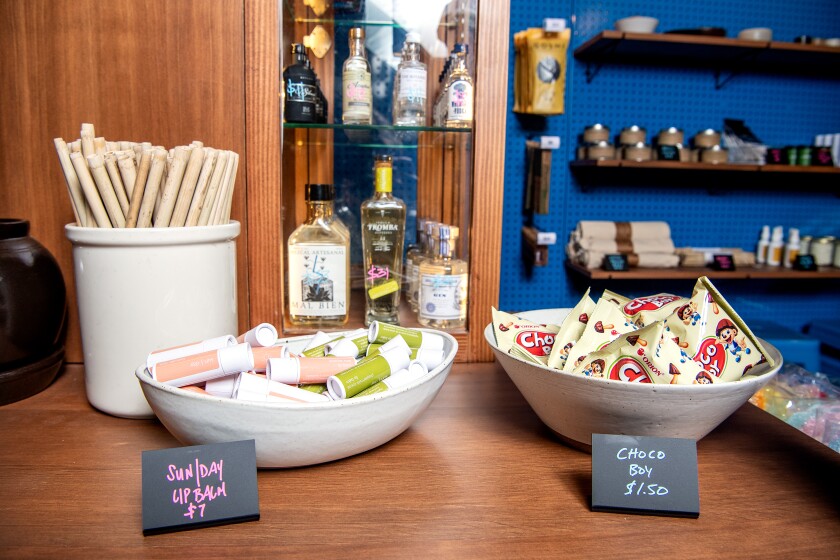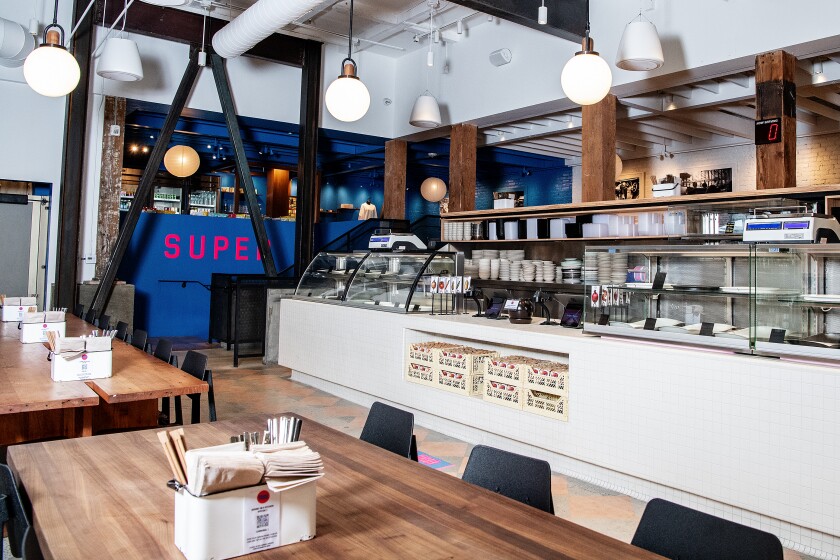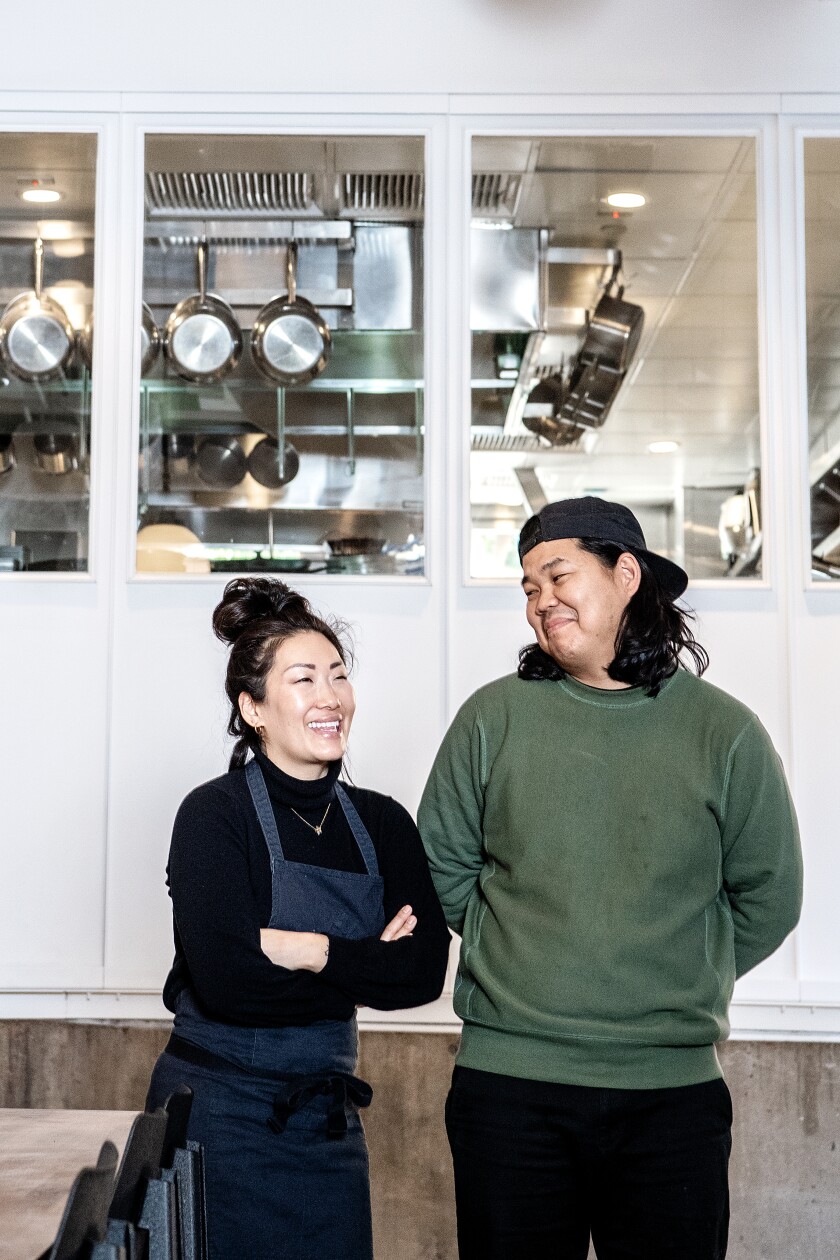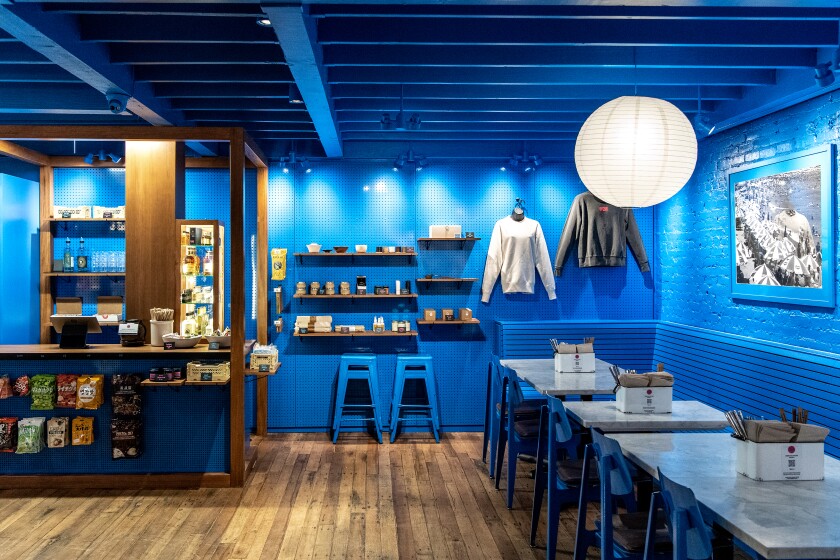Katianna and John Hong have cooked in Michelin-starred restaurants, but their latest endeavor has taken them on a completely different path. Scheduled to open Jan 10th is the Yangban Society, a casual deli and convenience store that they say challenges the very notion of what it is to be a Korean American.
Yangban was designed to be many things at once – a place to gather things for a picnic, have a drink before dinner, or sit down to eat. It occupies the two-story, 5,000-square-foot space that previously housed the upscale French restaurant Bon Temps, which closed in April 2020, has benches that line the walls on the second floor and are paired with marble tables.
Below, a row of display cases is filled with hot and cold items reminiscent of delicatessen culture and Korean banchan – including hot-smoked trout and cream cheese, and pickled vegetables. The deli also offers changing specialties from the kitchen – from kimchi and pork belly pozole to a jajangmyeon-meets-Bolognese fusion, which is served over rice. There’s Asian-style roast chicken, cooked slowly over charcoal and wood, and soft ice cream from Double 8 Dairy in Petaluma, one of only two water buffalo dairies in California. Customers can purchase canned cocktails and bottles of Hite beer or mug of champagne to combine with their meals and grab a table on the ground floor or upstairs.
The Yangban Society occupies the two-story, 5,000-square-foot room that previously housed Bon Temps in the Arts District.
(Mariah Tauger / Los Angeles Times)
In a corner of the second floor – characterized by bright blue walls – a separate super-mini-market will be housed, which pays homage to convenience stores in Japan and South Korea such as Lawson’s and FamilyMart. Shelves will be filled with Los Angeles-based and Asian-American brands, including Katianna’s hand-picked snacks, drinks and sundries, incense from LA tattoo artist Hyungi Park, Korean hand-knitted sponges, canned barley tea highballs, and a makgeolli rice wine , which Sawtelle Sake makes exclusively for Yangban.
The walls on the second floor are adorned with photo prints – of frank street shots from the 1980s and 1990s – by Seoul photographer Wook Kim, and the alley outside shows a wheat paste mural by Korean-American artist Dave Young Kim.

There is a separate super mini market that pays homage to convenience stores in Japan and South Korea.
(Mariah Tauger / Los Angeles Times)
For John, the restaurant is about hugging the son of Korean American immigrants and showing off all these things: “It’s about being proud and educating myself even more [about the Korean culture], and to find a conclusion in it. “
A developed taste
Katianna, born in South Korea, was only three months old when she came to the United States and was adopted by her German-Jewish father and Irish-Catholic mother. Her father worked as a lawyer; her mother was an art teacher.
Katianna, 38, grew up in a predominantly white suburb of New York State and said she identified so strongly with whiteness that she often wondered where she came from. (A DNA test, she said, showed she was 97% Korean.)

The deli offers changing specialties from the kitchen.
(Mariah Tauger / Los Angeles Times)
Family rituals included visiting a Unitarian church on Sundays; They then stopped at a deli where Katianna immersed herself in the culture and got herself large turkey sandwiches for lunch. Her paternal grandmother (“a great cook,” said Katianna) introduced her to the homemade matzo ball soup.
(Although Katianna’s cuisine is also influenced by her Irish Catholic heritage, she doesn’t talk about it that much – and it’s gotten a bit of a sore point between her and her mother about the Jewish part. And she’s Irish. And I think, ‘ I don’t know, I really like the matzo ball. ‘”)
Katianna said her mother sent her to Korean camps in the summer to learn about their culture, but she remembers it was a bad experience: “I didn’t have any Asian friends. I didn’t want to connect with them because that set me apart and was different, and I was just trying to fit in. “
When she was 16, an aunt and uncle took her on her first trip back to South Korea, but it was a frustrating experience. “I didn’t really feel connected here [in the United States]”Said Katiana. “And then after I went to Korea and found that Koreans don’t claim you because you don’t speak Korean and you look very American, I felt like I didn’t belong anywhere.”

It wasn’t until the Hongs took a trip to South Korea together that they noticed a shift in their thinking about Korean cuisine.
(Mariah Tauger / Los Angeles Times)
It wasn’t until she was in her mid-twenties – when she cooked at Mélisse in Santa Monica and met John in the kitchen – that she became interested in Korean culture again and he became her gateway.
John also grew up in a white neighborhood – Highland Park, Illinois – where it was common for him to visit delis and attend friends’ bar mitzvahs. His parents immigrated to the United States from South Korea in the 1980s. They didn’t speak much English and they ran a dry cleaner.
“It was hard because it didn’t help assimilation much,” said John, 34. “They were very Korean and made me deal with the fact that I didn’t really fit in.”
He was always surrounded by members of his extended family who spent time in the kitchen cooking Korean food, and those experiences led him into the culinary industry. After a two-year internship at the renowned Alinea in Chicago, he followed his family to LA and ended up with Mélisse.
Katianna and John were mere colleagues when she moved to Christopher Kostow’s The Restaurant at Meadowood in Napa, where she eventually became the first female head chef at a Michelin three-star establishment in the United States. She convinced John to join her, and they eventually began dating and rose together. Katianna opened Charter Oak, Kostow’s second restaurant in Napa, and John became the head chef at Meadowood.
It was only when they went on a trip to South Korea together that they noticed a change in the way they thought about Korean cuisine. The experience also inspired her to rethink her approach to fine dining. John says he originally wanted to work in the “best” (mostly Eurocentric) restaurants, but his goals began to change. “Your own ethnic food has the same value, but it just wasn’t necessarily presented,” he said.

The deli has undergone a transformation that plays with design elements.
(Mariah Tauger / Los Angeles Times)
Six years ago, they started dreaming of creating Korean dishes that channeled their own experiences. After getting married and having a child, they moved back to LA in 2019 with an idea for Yangban. It would be a departure from the world of fine dining that they have long lived in. Her vision of success had evolved.
“Success for us would be creating delicious food that we could stand behind and that has the integrity to reach everyone, not just that very small group of wealthy people who come to a three-Michelin-starred restaurant,” said Katianna .
They developed the tongue-in-cheek name “Yangban Society”, a reference to the Korean aristocratic ruling class of the Joseon Dynasty, who essentially made the laws, owned land and slaves, and benefited from their rich ancestry. The name of their deli was a satirical approach that turned the concept of social hierarchy on its head. “Basically, it’s about setting the standards for your society, being a positive member of your community, and establishing those core values compared to what family you were born into and how much money you have,” said John.
They funded Yangban by partnering with Sprout LA – the restaurant group that oversees places like Bestia and République – through a chance association, John explained. Shin Irvin, the founder and creative director of Folklor, known for his work with the Line Hotel and Gjelina, helped design the space.
“I totally understood what they were talking about because I’m Korean too and was adopted just like Kat,” said Irvin, 50. “The idea of starting an American / Korean / Jewish deli hit the right note on me. I grew up on the east coast with all these delicacies and saw the Korean influence in New York and here in LA. “
The Hongs have worked on several specials that showcase their combined experiences and love of market-driven ingredients. They have a pea sprout and chive salad, their interpretation of the spring onion salads of Korean grill restaurants. John’s version of a French dip is inspired by Korean galbi-tang (short rib soup) and Italian Chicago-style beef sandwiches.
When John thinks back on his formative years, he knows that he didn’t like Koreans because, like most children, he tried to adapt. He says he now realizes that it’s cool to be different when you’re older.
Katianna always thought that if she opened a respected traditional Korean restaurant, she would finally be accepted as a Korean by others. But that has changed for her: “In the process, I felt more comfortable with, ‘This is my version of Korean. That’s me, and that’s authentic for us. ‘”
712 S. Santa Fe Ave., Los Angeles, (213) 866-1987, yangbanla.com


Comments are closed.